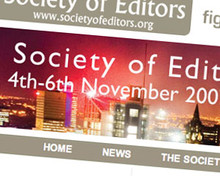
Georgina Henry told the Society of Editors conference, in Manchester, that developing the journalistic blog meant relinquishing and adapting many old print standards while adopting new approaches to web-based journalism.
"It's a different kind of journalism, and that has taken quite a lot of getting used to. Instead of being long-form and in-depth and quite rigorous in the editing and writing, it's now not completely without rigour but it is immediate, short, sharp and conversational, it's interactive," she said.
She said that anonymity could create an imbalance, as journalists are open and accountable, yet those commenting do not have to be.
Readers can often be critical of the site, its journalism and its writers, but she said that showing those comments as well as the positive ones was a sign of the site's strength. She added that comments criticising the publication for not playing by its (web) rules were a daily occurrence.
"I don't assume that I have to pay by their rules because they are not always right. There is this assumption when mainstream media gets into this space that you know nothing online and they [online readers] will tell you this every day, every minute of the day, 'you don't play by our rules because you just don't get it'.
"Well I just don't accept that. These rules are being written all the time and what professional journalists have to bring to the party is a really important thing in the vastness of the internet, there is value in good edited journalism, where people know what they are talking about and I make no excuses or apologies for that."
She said that since starting 20 months ago, Comment is Free has run 10,500 blog posts, with the addition of some 7,000 pieces of comment from the printed newspaper.
She claimed that the popular site is close to garnering its millionth comment and that there was so much activity every day that it was beyond the newspaper's complete control.
"You have to accept that the relationship between you and the audience has changed and that it will never go back. That means giving up some of the control.
"Not just in terms of letting people say what they want but also taking your lead from them, what do people want to talk about. What are they interested in, because sometimes it may be stuff that you may not have even noticed.
"It's this humbling thing of knowing that there are lots of people out there that have got very legitimate views and ideas about what is interesting."
She outlined some of the new rules - as she saw them:
"Engagement, engagement, engagement. I bang on about it the whole time, because that is the expectation of online journalism. Unless you get that you get nothing, I think. You have to make people understand that.
"Other things matter online, managing expectation is really important, I don't think we do that well enough. [Asking ourselves] what is this kind of journalism, what do we expect from your response to it?"
Some of those readers, she added, are hugely critical of what large media does on the web. Yet, Henry said she welcomed all kinds of views on the site.
"Some people see it as a sign of weakness, allowing people on to criticise what you are doing. I think you have to believe it's a sign of strength and be open about it.
"All over the site people are being rude about what I do. You just have to develop a very thick skin about what you do."
Free daily newsletter
If you like our news and feature articles, you can sign up to receive our free daily (Mon-Fri) email newsletter (mobile friendly).









